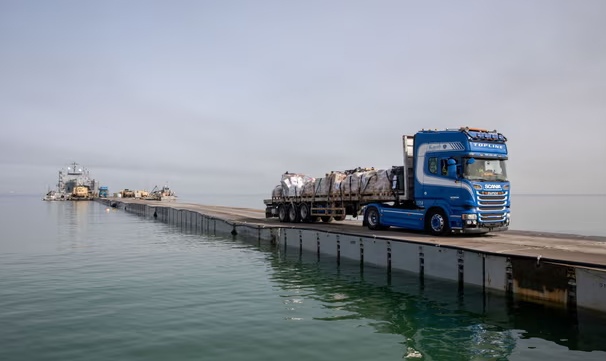Israel’s foreign minister said on Wednesday that the country’s army will order Palestinians to evacuate from northern parts of the occupied West Bank amid an ongoing major military incursion into the area. President Joe Biden was also reported to have authorised the Gaza pier operation when officials warned that humanitarian aid would face weather conditions in the Mediterranean Sea and security problems in the active war zone.
Earlier, the Israeli army launched raids in the northern West Bank, including in the towns of Jenin, Tulkarem and Tubas, killing 11 Palestinians so far.
In a statement on his website X, Israel Katz said the country’s army was working in Jenin and Tulkarem to thwart what he called “the terrorist infrastructure against Israel in the West Bank.” He added that the army’s operation includes the “temporary evacuation of Palestinian residents” in areas in the northern West Bank, in measures similar to those the Israeli army has undertaken in the Gaza Strip.
The Israeli army’s devastating offensive on the Gaza Strip has displaced hundreds of thousands of Palestinians from their homes and neighbourhoods for which the Israeli army has ordered evacuations.
Palestinians in the West Bank have also been subjected to brutal attacks by illegal Israeli settlers. According to the Health Ministry, the death toll in the West Bank since October 7 has reached at least 662 Palestinians and nearly 5,400 others have been injured by Israeli army shelling.
On July 19, the UN International Court of Justice declared Israel’s decades-long occupation of Palestinian land illegal and demanded the evacuation of all existing settlements in the West Bank and East Jerusalem.
Joe Biden ignored warnings
President Joe Biden ordered the construction of a temporary pier to deliver humanitarian aid to the Gaza Strip earlier this year, despite some at the US Agency for International Development expressing concerns that the project would be difficult to implement and would undermine efforts to persuade Israel to open “more effective” land crossings to bring food into the territory, according to a USAID inspector general’s report released on Tuesday.
Biden announced plans to use the temporary pier in his State of the Union address in March to speed up the delivery of aid to the Palestinian territory besieged by the war between Israel and Hamas.
But the $230 million military-managed project, known as the Joint Logistics Onshore Logistics Support System, or JLOTS, only operated for about 20 days. Aid groups pulled out of the project in July, ending a mission plagued by persistent weather and security problems that limited the ability to deliver food and other emergency supplies to hungry Palestinians. The inspector general report said:
“Multiple USAID staff expressed concerns that the focus on using JLOTS would detract from the Agency’s advocacy for opening land crossings, which were seen as more efficient and proven methods of transporting aid into Gaza. However, once the President issued the directive, the Agency’s focus was to use JLOTS as effectively as possible.”
At the time Biden announced plans to build the floating pier, the UN reported that virtually all of Gaza’s 2.3 million residents were struggling to find food and more than half a million were at risk of starvation.
Pier goals
The Biden administration set a goal that the US sea route and pier would provide food for 1.5 million Gazans for 90 days. But it failed, delivering enough food to feed about 450,000 people for a month, after which it was closed.
High waves and bad weather repeatedly damaged the pier, and the UN World Food Programme stopped working with the project after an Israeli rescue operation used a nearby area for hostage-taking, raising concerns about whether its workers would be seen as neutral and independent in the conflict.
US National Security Council spokesman Sean Savett said on Tuesday that the project had “had a real impact” on delivering food to hungry Palestinian civilians despite the obstacles. Savett said in a statement:
“The bottom line is that given how dire the humanitarian situation in Gaza is, the United States has left no stone unturned in our efforts to get more aid in, and the pier played a key role at a critical time in advancing that goal.”
The observers’ report also claimed that the USs failed to honour commitments it made to the World Food Programme to get the UN agency to agree to take part in distributing supplies from the pier to Palestinians.
WFP conditions were not met
The US agreed to conditions imposed by the WFP, including that the pier would be placed in northern Gaza, where the need for aid is greatest, and that a UN member state would provide security for the pier. The move was supposed to guarantee the WFP’s neutrality among the warring parties in Gaza, the watchdog organisation said in its report.
However, the Pentagon instead placed the pier in the centre of Gaza. WFP officials told the watchdog organisation USAID that they believed the US military chose the location because it allowed for better security for the pier and the military itself.
The Israeli military eventually provided security after the US military was unable to find a neutral country willing to do the job, the watchdog group said in its report.
A US official said a USAID official’s concerns that the project could undermine the overall aid effort were raised early in the process. In response, USAID allocated enough staff to allow the agency to handle both the pier and the land routes at the same time, said the official, who spoke on condition of anonymity because he was not authorised to discuss the matter publicly.
